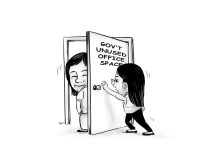
BY EDISON MARTE SICAD
A FORMER student of mine suffered from mental depression. It got to the point of having a therapist and some medications. How did he overcome such a difficult stage in his life? Allow me to share his recollections. May his words give us another perspective about coping mechanisms and a better appreciation of support systems.
***
I recently saw a TikTok video which discussed what happens when good friends see each other after an appreciable period of time:
“One of them asks, ‘how have you been?’ And the other says, ‘Well, you know…’ And then there’s a pause as life leaves his eyes for a variable number of seconds and he stares dejectedly into the distance and the air becomes heavy with a sorrow unspoken for fear of being judged weak…”
This is one of the most eloquent ways to put the pain of depression into words. The burdens of an “unspoken sorrow” and “fear of being judged” are reasons why depression self-perpetuates.
Suffering from clinically diagnosed Major Depressive Disorder myself, I explained to my therapists that this is the reason why I isolate. I have this unbearable need for the love and affection of other people but when I find the people ready to give these to me (e.g., family, friends, romantic partners), I treat them badly by becoming too emotionally needy and using them as an emotional crutch. Understandably, they lose all their energy dealing with the negativity I give off. They start avoiding me and I go back to square one.
I needed to interrupt that cycle somewhere: either I find someone infinitely understanding of my pain or I find a way to channel it into a non-human avenue. The former is impossible, but the latter seems doable.
What can I do to answer the question of “How have you been?” without burdening any person of my “unspoken sorrow”? Countless hours of introspection later and I discovered journaling.
Get a piece of paper (or a notebook) and just write and write some more. I bought a journal with a daily prompt (i.e., guide questions to help you know what things you can write about) so I can finally try this so-called healthy habit. Needless to say, it helped a lot. Through my journal, I was able to talk and rant to an inanimate friend – one who will not be burdened by the emotional toll I unloaded upon those who used to talk to me.
So, what makes journaling so good?
Firstly, it is a form of meditation. Before I begin my days, I try as far as practicable to sit down and write on my journal. It could be about anything. Sometimes, I would write about the people I will encounter throughout the day. Sometimes, I would lay down my schedule. Sometimes, I would write down a prayer. Sometimes, I would write down the things for which I’m grateful. In the backdrop of all these things is a single, continuous silence. I am alone with my thoughts, articulating them all in a safe and controlled environment, far from the judging eyes of others.
Secondly, it is a creative form of storing knowledge. It is not uncommon for me to face problems of motivation. Serendipitously, I would often find random YouTube Shorts or Instagram Reels of podcast snippets that would give me the pep talk I need for the rest of the day. I remember a long one:
“I know of no better life purpose than to perish in attempting the great and impossible. The fact that something seems impossible shouldn’t be a reason not to pursue it. That’s exactly what makes it worth pursuing. Where would the courage and greatness be if success was certain and there was no risk? The only true failure is shrinking away from life’s challenges.”
That quote is too wordy to commit to memory, so I put it into writing. Afterwards, I will reflect upon it. What is this “great and impossible” that I am pursuing? From which of life’s challenges am I shrinking away? The more I write in my journal, the more wisdom from which I can draw in the future.
Thirdly, and maybe most importantly, it is a safe form of emotional release. All too well, I know the perils of unhealthy catharsis. I have hurt people because I cannot handle my emotions, nor can I find a private medium to wash away the mental and emotional pains I endure every day. I deeply regret that, and my sincerest apology comes in the form of a changed behavior: going from displaying my pain to the world and letting the world misinterpret me into processing my pain in the secrecy and sanctity of my beloved diary. Honestly, there are times when my journal entry for the day is just me cursing at something and/or someone. I need that release so I can behave like a decent human being when I am around others. Anne Frank put it best: “Paper has more patience than people.”
Reader, I highly recommend you start writing your thoughts out on a journal as well. It can be a blank notebook, a fancy prompted one, or anything in between. What’s important is for you to honestly reflect on what you are about to do in the morning and what you have just done at night. Write down your thoughts and read them aloud. Talk to yourself and others about them. Journaling is a practical exercise to reduce unease, eliminate destructive thoughts, and build emotional strength. Try it out./PN







